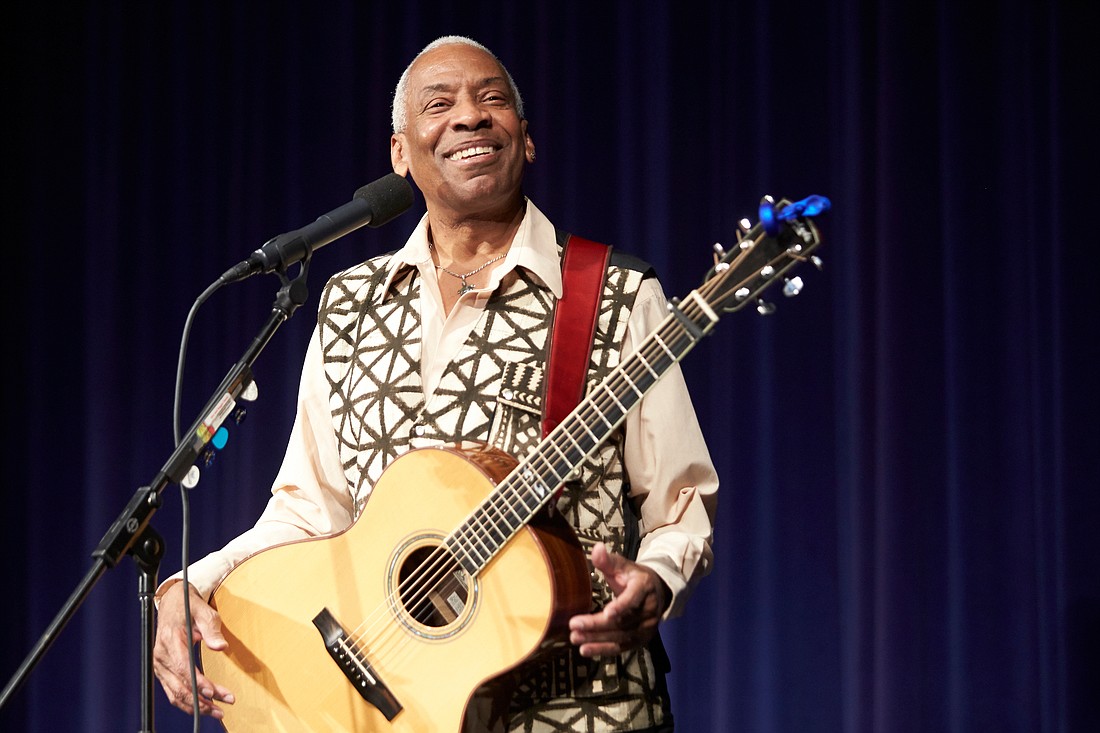- December 27, 2024
-
-
Loading

Loading

To change the world, don’t whisper. Raise your voice. America’s abolitionists did. Their words of fire sparked the struggle that broke the chains of slavery. The folk singers and poets of the civil rights movement shook things up and helped shatter the walls of segregation. That game-changing legacy lives on in the work of contemporary artists, such as poet Melissa Range and musician and storyteller Reggie Harris. They’re both now artists in residence at The Hermitage Artist Retreat in Englewood. Soon they will be making their voices heard.
Harris and Range will get the word out in “Historical Activism in Song and Print” as part of The Hermitage’s “On the Beach at Sunset” series. Their live performance will combine music and spoken words in an idyllic beachside setting. But there’s nothing idle about it.
Range and Harris cry out for a better future. But before raising their own voices, both listen to the voices of the past.
Take Range, for example. She’ll be reading poems from “Printer’s Fist,” her latest work in progress. Her own words, yes, but they’re informed and interlaced with the words of the abolitionists. How does she hear them?
No audio recordings exist, obviously. But the 19th century was a literate age. And the abolitionists put their thoughts on paper. They left behind a treasure trove of journals, newspaper articles, letters, pamphlets and petitions. Many abolitionist documents still survive in libraries across the country. Range has been poring through these archives since 2013. When she does, the heroes of history don’t seem so remote.
“When I read their words, it often feels like I can hear them speaking to me,” Range says. “I get a real sense of their humanity. … The abolitionists were all too human. They fought; they bickered; the movement splintered. There were times when the leaders weren’t speaking with each other.”
It sounds familiar. Contemporary activists fight online; 19th century crusaders fought in print. The squabbling abolitionists definitely remind Range of today’s feuding social justice warriors. But to her, that’s good news.
“These imperfect people helped topple an unjust system,” she says. “They did it before. And we can do it again.”
Along with telling stories, Harris will sing and play the songs of freedom at the Hermitage. His own songs include “Ready to Go,” which he composed while at the artists’ retreat. Most are iconic anthems by others, such as Sam Cooke’s 1964 “A Change is Gonna Come” and the traditional “Wade in the Water,” born in the struggles of the Underground Railroad.
Why not stick to his own songs to get his name out there? This is the age of branding and self-promotion, after all.
To Harris, truth is the point. Not self-promotion. And like Range, he also hears the voice of history.
“I don’t pretend to come out of nowhere,” he says. “Younger artists who lack a sense of history often try to reinvent the wheel. But I’m fully aware of where I come from. I stand on the shoulders of giants, and I know it.”
Harris adds that he’s not alone. The giants of the past didn’t come out of nowhere either.
“Growing up in Philadelphia, I was deeply influenced by spirituals, folks music and freedom songs,” he says. “Gospel singers like Mavis Staples and the Staples Singers drew from the well of African American spirituals. You can trace that music all the way back to the 1800s and 1700s. It’s a long, human chain of inspiration passed on from singer to singer, generation to generation. I’m privileged to be a part of it.”
Harris and Range both believe a change will come someday.
Until that day comes, they’ll make their voices heard.